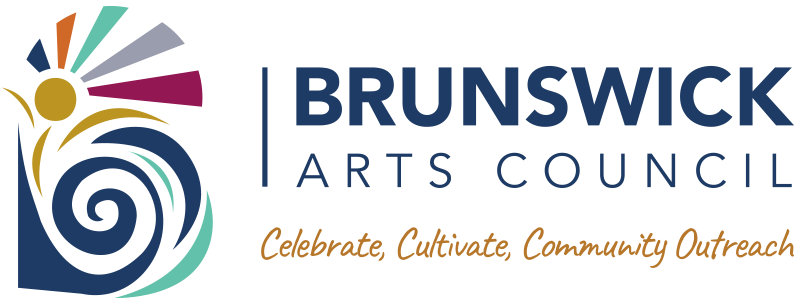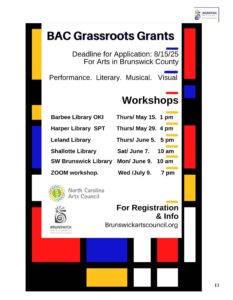Guidelines
Grassroots Grants Guidelines
Click Here for Link to Guidelines PDF
More Frequently Asked Questions
If I have received funding in the past, may I apply again?
Of course! If you have received funding in the past, you are eligible to apply again. However, prior funding does not guarantee continued support. Each application is reviewed in the context of the current program guidelines, funding priorities, and evaluative criteria. The review panel will also consider compliance with the previous contract and reporting requirements.
When reviewing projects that have received funding in the past, priority will be given to projects that are able to successfully demonstrate growth, artistic expansion, community support, and/or continued community need.
How much of the total project is the grant intended to cover?
Grants are not intended to cover the complete cost of the proposed project. In recent years, grants for Grassroots Arts projects have ranged from $500 to $5,000. Historically, the average grant has been approximately $1,200.
Grassroots Arts Grants should fund minimum 50% of the project’s total cash expenses of the total cost of your proposed project. Your project budget must demonstrate that a minimum of 50% of the proposed project income comes from other cash funding sources. In-kind contributions must be noted in the narrative.
May I apply for funding for more than one project?
A single applicant is able to submit up more than one application. If you have more than one project, it is best to discuss with BAC how to format the grant as one application or in separate applications.
Must I attend an informational workshop?
Attending an informational workshop is required for all first-time applicants and highly encouraged for previous grantees. In lieu of attending a workshop, an applicant may meet face-to-face with the BAC Grassroots Coordinator. The purpose is to give a personalized overview of the Grassroots program and to familiarize the applicant with the grant guidelines. It also gives applicants the opportunity to consult with the BAC coordinator on the specifics of their projects and to get feedback before applying.
Non-incorporated collectives wishing to apply for the Grassroots Arts Grants may apply through enlisting the sponsorship of an eligible non-profit or by partnering with an eligible organization.
What if my organization or group is not a nonprofit?
Fiscal Sponsorship:
A fiscal sponsor must be a non-profit organization in the county where the arts activity is taking place, which meets the requirements listed above. The fiscal sponsor will receive the grant funds and distribute them to the non-incorporated collective. An organization may serve as a fiscal sponsor for an unlimited number of applicants.
A letter of agreement between the two parties must be submitted with the application stating the willingness of the supporting organization to fulfill the obligations and duties of serving as fiscal and administrative agent for a grant award. In addition, the letter of agreement should specify the roles of each party.
A direct Grassroots applicant may serve as a fiscal sponsor and may sponsor more than one applicant. Direct NCAC applicants, however, may not serve as a fiscal sponsor for Grassroots applications.
NOTE: Sponsoring organizations must check with their accountants/financial personnel regarding tax liabilities and IRS reporting relative to sponsoring projects that are not directly related to the sponsoring organization’s mission. Sponsoring organizations are responsible for all IRS required reporting including the creation and distribution of 1099 forms where applicable.
Partner/Collaborative Organizations:
An individual artist or collective may also apply directly for Grassroots funds if working in partnership with a community-based non-profit. A letter of commitment from the community-based non-profit partner confirming the partnership with the applicant artist is required. The commitment letter must outline the scope of the partnership and each partner’s investment or contribution (in-kind and/or cash) towards the proposed project.
In the case of a partnership, the grant will be sent directly to the awardee, and the partner organization does not act as a fiscal sponsor.
Brunswick Arts Council can introduce artists and organizations to facilitate collaborations.
What is Acceptable Proof of Nonprofit Status?
Nonprofit status is preferred, an organization that has been operating for more than one year may apply. It is a stronger application to have a collaborative partner who is a nonprofit. Your organization may submit ONE of the following documents to prove non-profit status:
- Letter of Determination from the IRS indicating tax-exempt status under section 501(c)(3)
- Articles of Incorporation from NC State
- Official authorization as an arm of local government (i.e., a formal letter on official stationary signed by the appropriate county, city, town, or village executive)
The address on the document must be an address within Brunswick County.
How to submit a Draft Application for Pre-Submission Review?
The BAC Grassroots Coordinator is happy to review application drafts. Reviewing an applicant’s draft proposal is for the purpose of providing technical assistance and does not guarantee that it will receive funding.
When is the Application Deadline?
Applications must be received digitally by email in .pdf format or by US Postal System mid-August. Early submissions are encouraged. Incomplete, handwritten, or late applications as well as applications from ineligible organizations will not be considered.
What happens after the Grassroots Arts Grants Application is submitted?
After the Deadline Grant Review Process Applications are reviewed for eligibility, completeness, and accuracy by BAC staff. It is your responsibility to submit a complete and accurate application. As part of the review process, BAC staff may contact you by telephone or e-mail to clarify and review information. A panel of artists, arts administrators, educators, community leaders, and business people coordinated by BAC will then evaluate each application and recommend a level of funding based on the evaluation criteria, the funding priorities, and the grant guidelines. Upon request, panelists will be furnished with final reports as well as audit information, prior panel comments, and correspondence when considering organizations/individuals who have applied or have been funded in prior years. The panel’s recommendations are submitted to and reviewed by the BAC Board of Directors, and NC Arts Council, which has the final authority for all decisions.
How are funding awards decided?
Panel Criteria Awards are based on a competitive review process. Due to the strict guidelines, limited funds, and the competitive nature of the process, not all applicants will receive funding. Each application is reviewed on the basis of its own merits and against others in the application pool. The panel will make funding recommendations based primarily on the following criteria:
- Artistic merit including artistic and program quality and the expertise of the artists.
- Community demonstration of interest, support and benefit – without duplicating existing programs. Seek to serve a broad constituency.
- Adherence to application guidelines, with clarity and completeness.
- Feasibility – clearly defined project objectives, project implementation and management:
- Demonstrated ability of personnel to administer project
- Reasonable project budget
- Potential effectiveness of proposed promotional efforts throughout the community
- Applicant’s history with program success and contract compliance.
HIGH Funding Priorities include:
- Activities of local arts organizations
- New, emerging, and grass-roots organizations, particularly those that serve diverse and underserved individuals
- Projects that reflect the cultural traditions or contemporary creative expressions of a particular ethnic or culturally diverse group
- Applicants that provide a detailed marketing plan to reach/promote their project to underserved communities
LOW Priority Projects:
- Projects that do not utilize or pay professional artists
- Applicants who have not confirmed the artists to be utilized in the project
- Projects that do not benefit underserved communities
- Projects that contain minimal or poor marketing plans to reach underserved audiences
- Previously funded projects that do not exhibit further growth, artistic expansion, community support, and/or community need
- Projects that duplicate already existing and successful projects/services
What happens if my Application receives an Award?
Award Notification: BAC notifies all applicants by email regarding the status of their application after panel review. This will occur in late August.
All awarded organizations must sign and return a contract, and a No Over Due Tax Form, which outlines all agreements with regard to fulfilling obligations and the procedures for providing the following materials:
- A Final Program Report due by June 30th.
- Notification of your event(s) at least 2 weeks in advance with two complimentary tickets, if applicable. Projects may be audited by BAC staff, panelists, or other appointed persons.
- Credit to BAC and NC Arts Council for support on all publicity and printed materials. Suggested acknowledgement language is on the BAC & NCAC website.
- Write letters of Thank You to State Legislators
- Immediate notification if a project cannot take place or if there are any changes in project plans.
- Awarded funds must be returned before January 31st if a project cannot take place.
Grant checks are issued after a review of the panel comments with BAC staff and receipt of the signed contract and all other requested information.
What happens if my Application isn’t funded?
Applicants should consult with the BAC Grassroots Coordinator to review the considerations that went into the panel decision.

